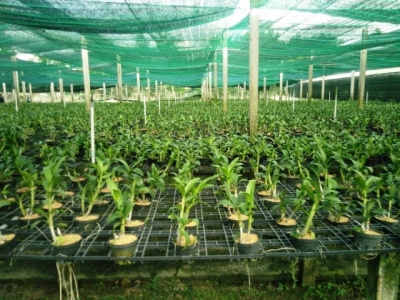Ho Chi Minh City ploughs ahead with high-tech agriculture

Despite galloping urbanization in Vietnam’s largest metropolis, Ho Chi Minh City is also determined to develop its agricultural production and is enlisting the help of overseas Vietnamese, among others, for this effort.
Nguyen Quoc Vong from Australia’s RMIT University told a recent conference devoted to promotion of urban agriculture that farming within municipal boundaries is not only the practice of cultivating food in town, but also contributing to the protection of the local environment.
Over the past decade, Ho Chi Minh City has taken steps to change the structure of crops and livestock to ensure the sector’s sustainable development. Agricultural gross domestic product grew 5.8 percent in 2016, an almost five-fold increase compared to the national average. Local agricultural production value grew 5.8 percent, a four-fold increase compared to the figures for the rest of the country. In the first nine months of the year, the city’s agricultural production value increased by 6.2 percent.
To keep this momentum going, Ho Chi Minh City is now seeking to focus on developing high-tech and biotechnology agricultural production. Nguyen Phuoc Trung, director of Ho Chi Minh City Department of Agriculture and Rural Development, told participants at the conference that with the help of overseas Vietnamese experts and entrepreneurs, Vietnam will obtain and develop productive seeds and breeding animals.
The city is also calling for investment in fisheries, animal husbandry, cultivation and post-harvest technologies.
Vietnamese-Canadian Nguyen Thanh My said Ho Chi Minh City must develop all the stages of its agriculture - cultivation, processing, distribution and consumption. In addition, it should improve the quality of its fertilizers to include more microorganisms.
Vietnamese-Canadian Nguyen Quoc Binh said Ho Chi Minh City should establish high-tech agricultural areas, develop seedlings, promote the processing industry, strengthen application of post-harvest technologies, and adopt support policies for high-tech agricultural businesses such as tax incentives and high expert salaries, so they can focus on research and development activities.
According to Vietnamese-Japanese Dang Luong Mo, while the gap between the status of agricultural production and the new requirements for development is huge, the Vietnamese government is facing pressure to reform the sector towards sustainable development accompanied by greater benefits to farmers. That means the country needs a strong push, even a new revolution in agricultural production, to connect all stakeholders and all stages of the value chain.
Có thể bạn quan tâm
 Workshop discusses Belgian support for Vietnam’s agriculture
Workshop discusses Belgian support for Vietnam’s agriculture The workshop looked into engagement between the two countries’ governments, universities, institutions, and businesses
 PM approves agricultural restructuring plan in 2017-2020
PM approves agricultural restructuring plan in 2017-2020 The plan also calls for more applications of science and technology in the sector to create high-quality varieties, adopting intensive farming
 China makes up three-fourths of Vietnam’s vegetable, fruit exports
China makes up three-fourths of Vietnam’s vegetable, fruit exports Vietnam exported US$240 million of vegetables and fruits last month, taking the total to US$2.86 billion in the year to end-October, up 42.6% year-on-year.